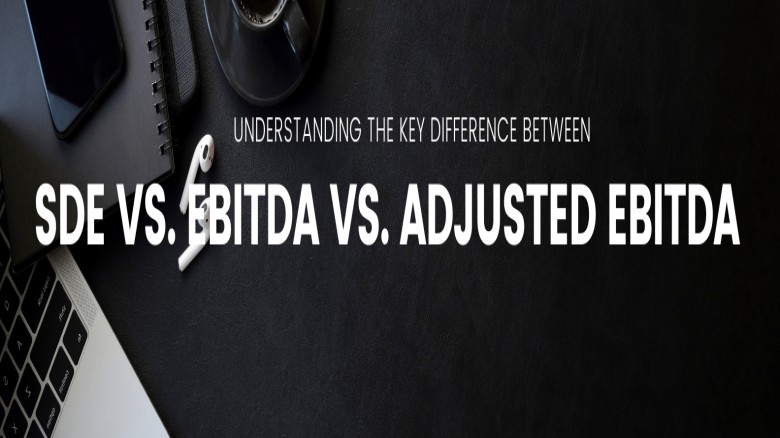Understanding SDE, EBITDA, and Adjusted EBITDA Differences
In the realm of business valuation, the terminology surrounding financial metrics can often lead to confusion, particularly when considering Seller’s Discretionary Earnings (SDE), Earnings Before Interest, Taxes, Depreciation, and Amortization (EBITDA), and Adjusted EBITDA. Understanding these metrics is crucial for investors, buyers, and sellers alike, as they significantly impact the valuation multiples and ultimately, the perceived worth of a business.
WHAT IS SDE?
Seller’s Discretionary Earnings is an indispensable metric, especially in small businesses or those heavily influenced by the owner-operator. It encapsulates not just the profits but also discretionary expenses and benefits that might not be reflective of a company's core operational performance. These could include the owner's salary, personal expenses charged to the business, perks like company cars or travel, or one-time expenses that aren’t part of regular operations.
For instance, a family-owned restaurant might show lower profits on paper due to the owner’s higher salary drawn from the business. However, the actual cash flow and potential profitability might be more accurately represented by SDE once these discretionary expenses are accounted for.
WHAT IS EBITDA?
Earnings Before Interest, Taxes, Depreciation, and Amortization( EBITDA) is a metric commonly favored by investors, analysts, and larger corporations. It serves as a standardized measure to compare companies’ operational efficiency across industries by eliminating the impacts of financing and accounting decisions. EBITDA allows for a clearer assessment of a company's core profitability by excluding non-operational elements like interest expenses, taxes, and accounting practices.
This metric is particularly useful when comparing companies of similar sizes and industries but might overlook certain critical expenses that impact the day-to-day operations, especially in smaller businesses or those heavily influenced by non-recurring costs.
THE REFINEMENT OF ADJUSTED EBITDA:
Adjusted EBITDA fine-tunes the EBITDA metric by incorporating additional adjustments, such as non-recurring expenses, one-time charges, or extraordinary events that might distort the true operational performance. These adjustments provide a more accurate portrayal of the ongoing profitability of the business by removing items that are not part of regular operations.
For instance, if a company underwent a significant restructuring with associated costs in a particular year, these costs might not reflect the company's usual operational performance. Adjusted EBITDA can help in normalizing these expenses to assess the underlying profitability more accurately.
THE CONTEXTUAL APPLICATION OF METRICS:
Small Businesses and SDE: In the realm of small businesses, especially those run by sole proprietors or families, SDE stands out as a vital metric. It encapsulates the owner's discretionary spending and allows potential buyers to understand the true earnings potential. For instance, a small manufacturing firm might have various expenses tied to the owner, like personal travel or family healthcare benefits, which are crucial components of SDE but might not reflect in EBITDA or Adjusted EBITDA.
Complex Business Structures and Adjusted EBITDA: In industries where non-recurring expenses are common or where there are significant fluctuations in financial performance due to one-time events, Adjusted EBITDA becomes invaluable. For instance, a technology company undergoing substantial research and development investments might have fluctuating expenses, making Adjusted EBITDA a better metric for normalizing these costs.
Investor Perspectives and EBITDA: Investors often favor EBITDA as it provides a standardized metric for comparing companies across different industries. It allows for a clear assessment of operational efficiency and profitability. However, this metric might overlook certain critical aspects of smaller businesses or those with unique expense structures, potentially undervaluing their true earning potential.
MULTIPLES AND THEIR APPLICATION:
Understanding how valuation multiples are derived from these metrics is essential:
- P/E Ratio and SDE: Applying a Price-to-Earnings ratio based on SDE might be more suitable for small businesses or those driven by the owner's involvement. This approach helps potential buyers or investors gauge the return on their investment more accurately, considering the discretionary expenses of the owner as part of the business's value.
- EV/EBITDA and Adjusted EBITDA: Larger companies or those seeking investment might utilize the Enterprise Value-to-EBITDA ratio. Adjusted EBITDA, which factors in extraordinary expenses, helps normalize the earnings, making it a preferred metric for such valuation multiples. This approach aids in comparing companies' values irrespective of their financing structures or accounting decisions.
VALUATION MULTIPLES: THE CRUCIAL ASPECT
Valuation multiples, such as P/E ratio or EV/EBITDA, are fundamental tools used to estimate a company's worth. They directly rely on these earnings metrics, and misapplication can lead to substantial valuation discrepancies.
Using an incorrect metric in the valuation process can either inflate or deflate a company's perceived value, potentially impacting negotiations in a sale or investment scenario. Moreover, different industries might have varying preferences for these metrics based on their typical business structures and cost dynamics.
CONCLUSION:
Navigating the intricacies of SDE, EBITDA, and Adjusted EBITDA is crucial for accurate business valuation. The context in which these metrics are applied significantly impacts the perceived worth of a company. By discerning the specificities of each metric and aligning them with the business's nature, stakeholders can ensure a more precise valuation, facilitating informed decisions in the dynamic landscape of mergers, acquisitions, or investment opportunities.
.png)

.png)













































Leave A Comment
Post a comment
Comments :